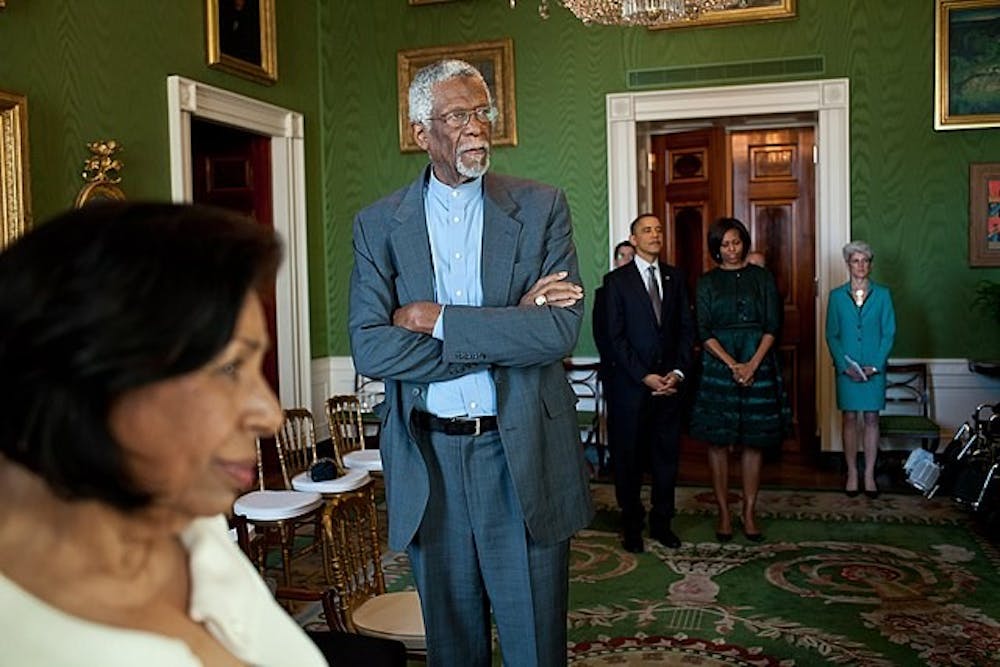On Sunday, the world lost one of the greatest athletes to ever live.
11-time NBA champion Bill Russell’s Twitter account announced on Sunday that the former Boston Celtic and Presidential Medal of Freedom recipient passed away at the age of 88. Russell won a record 11 championships during 14 seasons in the NBA with the Celtics, including two as a player-coach in 1968 and 1969. The University honored his accomplishments in sport and activism by bestowing him with an honorary doctorate of humanities in 2001.
“As Americans grappled with civil rights during the turbulent sixties and seventies, he was appointed the first African-American professional coach of a major sport, and the victories he won throughout his life were as much victories for equality and fair treatment as they were victories for this quintessentially American sport,” the University wrote in a statement at the time of the ceremony. “Known as a gentle man and a gentleman, he continues to be a voice of common sense and of courage who shifts our gaze upward to the highest ideals of American life.”
Born in segregated Louisiana and raised in public housing in Oakland, California, Russell received just one college scholarship offer at the University of San Francisco, where he was one of the most dominant college basketball players of all time. He led the university team to back-to-back NCAA titles in 1955 and 1956, a run which included an astonishing 55 consecutive victories.
Before joining the Celtics in the NBA, Russell led Team USA to the gold medal in basketball at the 1956 Melbourne Olympics, averaging 14.1 points per game. Russell’s dominance continued into his first NBA season, where he led the league in rebounding with an earth-shattering 19.6 boards per contest. The Celtics would go on to win their first NBA title that year, and two years later would begin an unprecedented eight-year streak of NBA championships.
That run would end when Red Auerbach retired as the head coach of the Celtics in 1966, but Russell soon took over as a player-coach and led the team to titles in his two final seasons as a player in 1968 and 1969. Because of his success in the NBA Finals, the league named the Finals MVP Award after Russell in 2009.
Considered one of the greatest defenders of all time, Russell won five MVP awards during his career, as many as Michael Jordan, and was ranked No. 18 on ESPN’s list recognizing the greatest athletes of the 20th century in 1999. In 2013, a statue of Russell was erected outside of Boston’s City Hall.
Perhaps even more important than his sporting accomplishments, were the advancements Russell made as an advocate for civil rights. Often tormented by white fans and segregated from white teammates, Russell experienced the same discrimination suffered by so many African-Americans despite his status as a superstar athlete. An active participant in the Black Power movement, he was known by the name Felton X and owned land in Liberia. He was also famous for having attended the Cleveland Summit in 1967, alongside NFL running back Jim Brown, fellow basketball star Lew Alcindor (now known as Kareem Abdul-Jabbar), and Muhammad Ali, to support the latter’s decision to refuse conscription for the Vietnam war.

Russell first made national headlines for being outspoken on matters of race after boycotting an exhibition game in Kentucky in 1961 after he and his Black teammates were refused service at a restaurant in the state. However, the abuse Russell and other Black athletes suffered was not limited to the South, and he had a strained relationship with the Celtics fan base due to his outspokenness on the racist abuse he faced at the hands of the largely-white Boston crowds. As was commonplace for many civil rights activists at the time, Russell was tracked by the FBI, who noted his outspokenness and refusal to sign autographs, calling him “an arrogant Negro.”
Beyond issues of racial justice, Russell was also a staunch advocate for unionization, and was part of a group of players who boycotted 1964 All-Star Game in Boston in an effort to force the NBA to recognize the demands of their union. Russell is often credited as one of the most important players in the early days of the Players Association, the modern-day union for NBA players.
As the NBA’s first Black superstar, Russell used his platform in commendable manner throughout his life to combat injustice, while also cementing his legacy as one of the greatest athletes who ever lived. His strength and bravery paved the way for many of today’s athletes to stand up for social and economic justice. For that, his legacy will be forever enshrined among the great trailblazers of American athletics.
“At a time when it was far more difficult and dangerous to do so, Bill used his voice openly and fearlessly to serve as a fierce advocate for equality, civil rights and social justice,” Tamika Tremaglio, the Players Association’s executive director, said in a statement. “His actions laid the foundation not just for NBA players, but for professional athletes from all sports and others, to stand up and call for change in the face of racial injustice and inequality.”

Wilson Conn is a co-head editor for the Sports section at the ‘Prince.’ He is also a senior writer for the Podcast section. He can be reached at wconn@princeton.edu or on Twitter at @wilson_conn.








